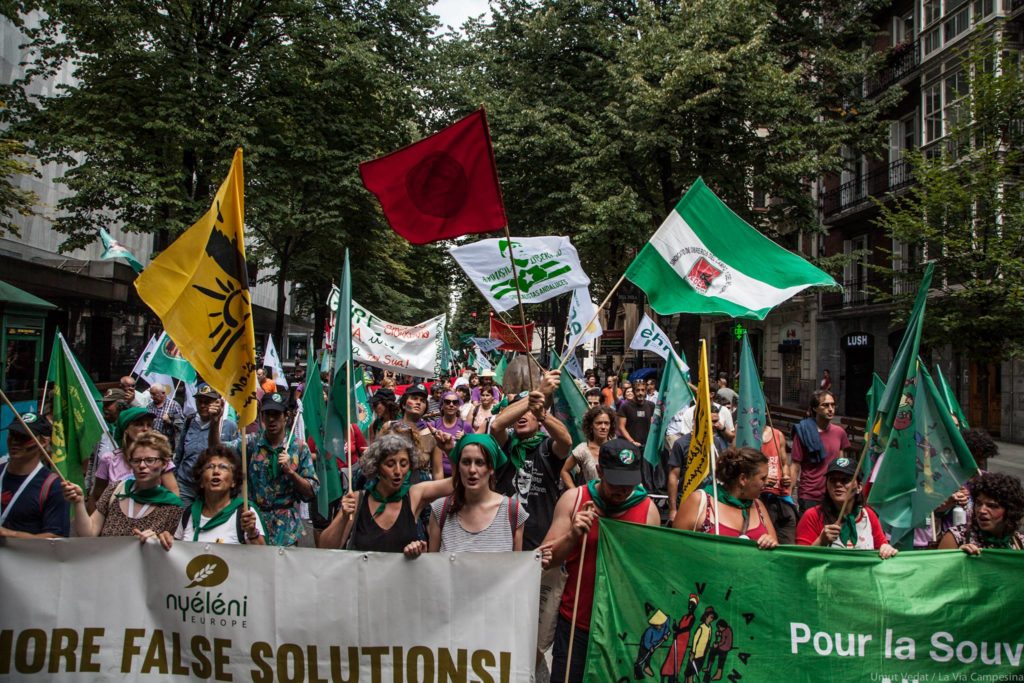False good news for future EU free trade agreements
Todas las versiones de este artículo: [English] [français]
European Coordination Via Campesina | 27 June 2022
False good news for future EU free trade agreements
Press release
The European Commission unveiled a new plan on 22 June, setting out how it intends to ensure that EU global trade agreements protect the climate, the environment and workers’ rights.
According to the announcements, the plan will ensure that trading partners commit to the standards set out in the Paris Climate Agreement and the core principles of the International Labour Organisation (ILO).
ECVC is heavily critical of the lack of ambition shown by the European Commission to tackle only future free trade agreements, meaning the pre-existing FTAs can continue their environmental and social devastation.
These FTAs benefit import/export agribusinesses, who are responsible for land grabbing, exploiting resources, and feeding financial investments which only look to speculate resources for their own gain. The Commission is clearly not interested in the real causes of global problems and issues, given that the basis of these agreements is destructive for the climate, the environment, and the sovereignty of countries, especially in the south.
As the WTO concludes its 12th ministerial meeting, it is clear that the EU’s momentum of the past three decades will continue, consisting of deregulation, privatisation and policies that have structurally violated the rights of peasants, decimated rural economies, domestic agricultural markets and the food sovereignty of our territories.
For ECVC, the EU cannot continue to sign new, supposedly sustainable free trade agreements without rethinking international trade rules as a whole.
In fact, this exacerbated liberalisation of trade prevents the implementation of new public policies aimed at promoting diversified food systems around the world and facilitating the sustainable relocalisation of agricultural production. Agriculture should no longer be seen as an exchange commodity, but as a human right that is necessary to ensure the prosperity of territories. This must be achieved by favouring public stockpiling, and market regulation that ensures a fair income for farmers and secure access to healthy food, including for the poorest sections of society.
Supporting local production and helping southern countries to secure their own food supplies rather than relying on imports would be a real step towards a green, fair and just international trade policy.
If the Commission’s ambition is to have fair food systems in line with the Paris Agreements, it must change the trade paradigm by recognising that agricultural should be excluded from trade policy to make real progress on climate and environment. It must ensure that farmers that produce locally receive a fair income and that their rights are respected in Europe and worldwide. Therefore, the priority for the EU, as a key player in international trade, should be to challenge the rules of the 1994 Marrakech Agreement, rather than trying to minimise its impacts.
Contacts :
ECVC office: press@eurovia.org
Morgan Ody, ECVC Committee Coordination – +33 626 97 76 43 – FR, EN
Andoni García Arriola, ECVC Committee Coordination, +34636451569 – ES, EUS
Antonio Onorati – ECVC Trade Working Group: +39 3408219456 (EN, FR, IT,ES)
What is the content of the plan ?
Context: The aim is to improve, through a clear enforcement mechanism, the existing TSD (Trade and Sustainable Development) chapters in the EU’s trade agreements (Free Trade Agreements), which contain a comprehensive set of binding provisions and are anchored in multilateral standards (International Labour Organisation = ILO conventions, Multilateral Environmental Agreements = MEAs).
What is new: For the first time, the Commission is considering the use of sanctions against partner countries that violate two multilateral agreements: the Paris Agreement on Climate Change and the International Labour Organisation (ILO) Declaration.
Other new elements are: the definition of appropriate targets and roadmaps for more effective results, the intensification of cooperation processes with partner countries to promote compliance with international labour and environmental standards, and the opening of new markets for the import and export of green goods and services and raw materials, “which is particularly important to reduce dependencies in the current geopolitical climate” (Commission Communication).






